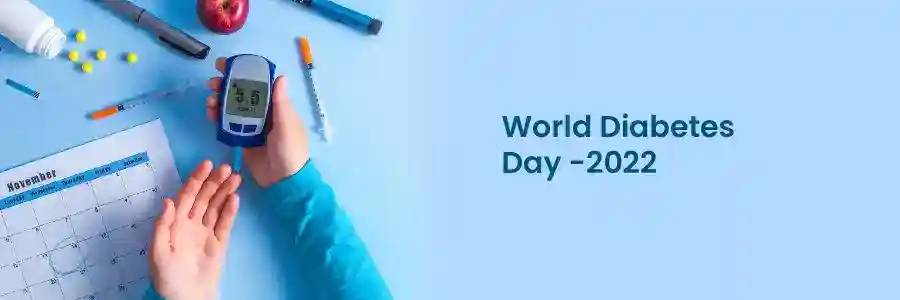- Cardiology 84
- Dermatology 45
- Endocrinology 33
- ENT 16
- Fertility 190
- Gastroenterology 78
- General-Medicine 81
- Gynecology 80
- Hematology 19
- Infectious-Diseases 33
- Neurology 52
- Oncology 34
- Ophthalmology 23
- Orthopedics 69
- Pediatrics 31
- Procedure 23
- Public-Health 144
- Pulmonology 59
- Radiology 8
- Urology 68
- Wellness 161
- Woman-and-child 77

World Diabetes Day
Diabetes affects one in ten people worldwide, making it a significant global health issue. World Diabetes Day, held on November 14 annually, aims to raise awareness about diabetes, its types, symptoms, and treatments.
This year's theme, "Education To Protect Tomorrow," focuses on increasing access to high-quality diabetes education. Promoting a healthy, active lifestyle is essential to lowering the risk of Type I and Type II diabetes, emphasizing the role of families in diabetes management, care, prevention, and education.
Secure your health with a second opinion. Make informed decisions and book your appointment today!
Get A Second OpinionUnderstanding Diabetes
Diabetes is a long-term health disorder that affects how the body converts food into energy and results in high blood glucose levels. This happens when the body either doesn't create enough insulin or doesn't use the insulin as efficiently as it should.
When insufficient insulin is produced, or cells stop reacting to insulin, excess blood sugar stays in the body, leading to significant health problems such as kidney disease, heart disease, and vision loss over time. Diabetes medication, self-management, education and support, and maintaining health care appointments can help reduce the risk of diabetes.
Know the Types of Diabetes
Type 1 Diabetes
Type 1 diabetes is brought on by an autoimmune response that prevents the body from producing insulin. Type 1 diabetes affects about 5-10% of people with diabetes. This is a common diagnosis among children, teenagers, and young adults.
Type 2 Diabetes
The body does not use insulin properly in type 2 diabetes and cannot maintain normal blood sugar levels. It develops over time and is commonly diagnosed in adults. Because the symptoms are not noticeable, it is important to have blood sugar levels tested.
Gestational Diabetes
Gestational Diabetes can occur in pregnant women who have never had diabetes. If the mother has gestational diabetes, the baby may be at greater risk of health complications. This diabetes usually resolves once the baby is born, but it raises the chance of acquiring type 2 diabetes later in life.
Prediabetes
This stage comes before type 2 diabetes. However, blood glucose levels in prediabetes are higher than usual but are not diagnosed as type 2 diabetes.
Early detection is critical for all types of diabetes. It can save lives, prevent medical emergencies, and lower the risk of life-altering complications later on. That's why we want to ensure everyone knows the warning symptoms and their risk of acquiring type 2 diabetes.
Signs of Diabetes
Here are the early signs of diabetes:
- Sudden weight loss
- Frequent urge to urinate
- Increased hunger and thirst
- Urinary tract infection
- Erectile dysfunction
- Extreme fatigue
- Dry and Itchy skin
Ready to take control of your health journey? Book your appointment now and start your path towards wellness today!
Book an AppointmentTips for Diabetes Control and Management
Lifestyle changes can help to prevent the onset of the disease if people have prediabetes, which is high blood sugar that has not yet led to a diabetes diagnosis. Maintaining blood sugar levels within the doctor's advised range can be challenging, and that's because various factors can cause blood sugar levels to change, often without warning.
The most prevalent form of diabetes, type 2, can be stopped with lifestyle changes. Prevention is essential if you already have type 2 diabetes or are at an elevated risk of developing it. Incorporating the following lifestyle changes can help control diabetes.
- 1. Lose extra weight
- 2. Be more physically active
- 3. Eat healthy plant foods
- 4. Eat healthy fats
- 5. Medication and monitoring
Timely check-ups and lifestyle changes can greatly impact how this condition is treated and help millions of people overcome it. This World Diabetes Day 2024, say no to Diabetes.
Frequently Asked Questions
World Diabetes Day is observed globally on November 14th each year to raise awareness about diabetes and its impact on individuals and society.
It aims to educate people about diabetes prevention, management, and the importance of early diagnosis to reduce its growing impact worldwide.
The theme for World Diabetes Day 2022 focuses on promoting equitable access to diabetes care and prevention for all.
Participation can involve organizing or attending awareness events, wearing blue (the color associated with diabetes awareness), and sharing information on social media.
Family history, a poor diet, inactivity, obesity, and certain ethnicities are also risk factors.
Symptoms may include increased thirst, frequent urination, weariness, impaired eyesight, and slow-healing wounds or sores.

- Cardiology 2132
- Dermatology 168
- Endocrinology 135
- ENT 97
- Fertility 217
- Gastroenterology 232
- General 478
- General-Medicine 1685
- Gynecology 169
- Hematology 85
- Infectious-Diseases 208
- Neurology 207
- Oncology 345
- Ophthalmology 65
- Orthopedics 187
- Pediatrics 83
- Procedure 72
- Public-Health 209
- Pulmonology 126
- Radiology 13
- Second Opinion 311
- Urology 294
- Wellness 600
- Woman-and-child 447
Related Blogs
If you have any questions, please fill out the enquiry form or call us, and we will get back to you promptly.
040-68334455